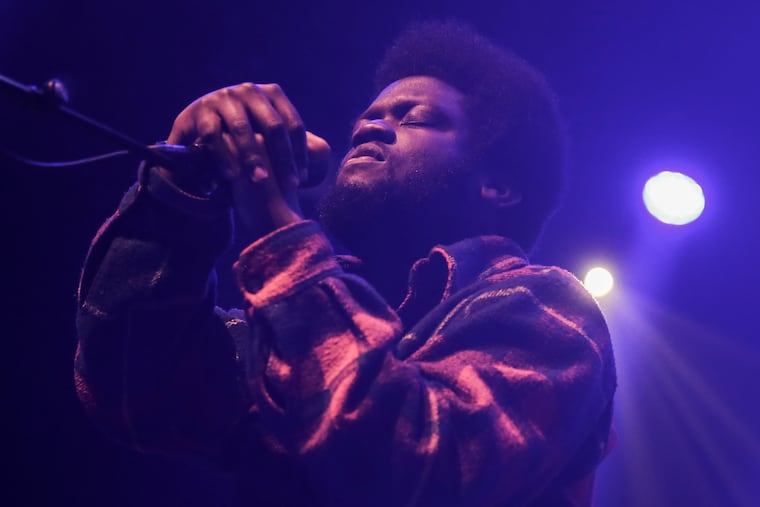Review: Michael Kiwanuka’s timeless soul music at Union Transfer
The British singer of Ugandan heritage played before a packed house that had been sold out since the release of his superb third album, 'Kiwanuka,' last fall.

Michael Kiwanuka stepped into the blue stage light and immediately cast a spell. Then he held the room rapt for the next 1 hour and 45 minutes.
He did it on Monday night at Union Transfer by taking his time. One of the most salient characteristics of Kiwanuka’s music is its patience. His signature song, “Cold Little Heart” — best known as the lead-in for the hit HBO series Big Little Lies — begins with a five-minute instrumental intro before his voice is even heard. Then it carries on, in no rush, for another five.
Playing before a packed house that had been sold out since the release of his superb third album, Kiwanuka, last fall, the British singer of Ugandan heritage saved “Cold Little Heart” for the next-to-last song of his encore.
He paired that with “Love & Hate,” the title track of his 2016 album, encapsulating the resilient spirit, and triumph over sorrow and self-doubt, that runs through his music. “You can’t take me down, you can’t break me down,” he sang. “No more pain, and no more shame and misery.”
At 32, Kiwanuka comes across as an old soul. His music harkens back to an analog era. Before he took the stage, Sly & the Family Stone and the Rolling Stones played on the sound system. His warm, weathered, deeply relaxed voice is entirely his own but puts one in mind of vintage soul-rock singers like Bill Withers and Van Morrison.
Retro-soul acts that consciously evoke a classic ‘60s sound are not hard to find these days, from legit veterans like Lee Fields & the Expressions (who play Union Transfer this Saturday) to younger students of the genre such as St. Paul & the Broken Bones.
Kiwanuka sets himself apart because his music is never overtaken by nostalgia. Since his 2012 debut Home Again — whose title track, with his voice accompanied by little more than his own acoustic guitar, was a luminous highlight on Monday — he has framed his songs in non-machine-driven arrangements that free them to live in the moment.
He’s not trying to recapture something that has been lost.
His albums have gotten more confident over time, never more so than on Kiwanuka, whose cover depicts him in the style of a Tudor king in a painting by Markeidric Walker.
This album and Love & Hate were recorded with producers Danger Mouse and Inflo, both expert in adorning his songs with strings, keyboards, and backup vocals that create a lush tapestry of sound equal to the richness of the singer’s voice.
On Monday, Kiwanuka and his six-piece band (including two backup vocalists) impressed with their ability to bring the sophistication of the recordings fully to life on stage.
On the opening “Piano Joint (This Kind Of Love),” Kiwanuka’s grainy voice was cushioned by keyboards, as he sought a connection with his audience: “All I want is to talk to you / Turn me on to something true.”
Mid-set, Kiwanuka sang Love & Hate’s arresting “Black Man In A White World,” accompanied at the start only by his own and the audience’s hand claps. It had a timeless resonance, harkening back to African American work songs and spirituals.
As a personal statement of pride and defiance, though, the song was inspired by a music business reality: Because Kiwanuka’s soul music is categorized more as “rock” than contemporary R&B in a segregated industry, he’s a black man with a largely white audience.
Kiwanuka’s compulsion as an artist to connect with the community at large was realized from start to finish in a show likely to stand as one of the most compelling tours to come through Philadelphia in 2020. “Show me love, show me happiness,” he sang in “Rule The World,” as the backup singers’ voices soared in flourishes reminiscent of Merry Clayton in “Gimme Shelter.” “I can’t do this on my own.”